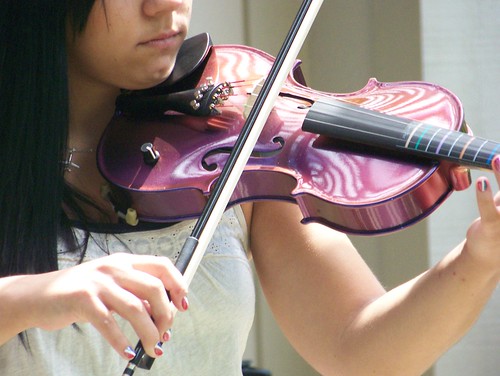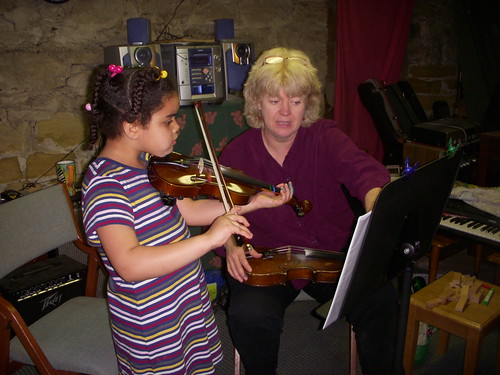I recently had my first musical instrument lesson in four years since my last piano lesson when I was a junior in high school. After speaking with Liz Shaw, the Blue Eagle violin and banjo instructor, for my last post about the music store, she offered to give me a complementary violin lesson. Surprised by her generosity, I jumped at the opportunity.
Even though piano will always be my main instrument, I have been intrigued to learn to play the guitar or the violin. The few times I have tried the guitar, my fingers have not had the stamina to hold the strings down. I figured the thinner strings on a violin would be easier for my fingers to handle. With this thought in mind, I purchased a violin in December of 2007.

My Barcus-Berry ChromaticAE Acoustic-Electric Violin
I decided to attempt to teach myself how to play using a self taught book. I seemed to get the hang of it for a short while, but soon lost motivation. Learning only children songs as opposed to the experienced songs I knew on the piano left me frustrated, only to find myself back on the keys in my comfort zone. Ever since then, I barely touched my violin.
Shaw’s lesson was an eye-opening experience for me. Not only did I get to hear her play with amazing skill, but I was reassured that learning to the play the violin was something I could actually do with proper instruction, determination and available time.
Shaw began our lesson with the basics, such as the proper way to hold the violin and bow. Then she broke down the notes on each string. This is one thing that was always difficult for me to grasp. On a piano, one key equals one note. On a violin, each string holds numerous notes, making it a challenge to remember where each note is. Shaw simplified this concept by starting with a G scale. Breaking the strings down, made this foreign concept more understandable.
My half hour lesson with Shaw flew by. I was left wanting to learn more; wanting to play more. In the future, I hope to continue lessons with Shaw if I can find the time between classes and work.
I will continue to update on my violin learning process when it occurs. If you have had a unique experience with learning to play an instrument, please share!
-J-

